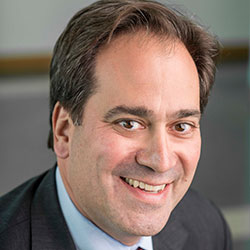Chad Mirkin Receives King Faisal Prize for Work in Chemistry
First Northwestern professor to win most prestigious award in the Muslim world
The King Faisal Foundation on January 4 awarded Northwestern University professor Chad A. Mirkin the 2023 King Faisal Prize (KFP) in Medicine and Science for his work in chemistry.
Established in 1979 by the King Faisal Foundation and named after Faisal bin Abdulaziz, the KFP is a merit-based award honoring those whose work “contributes to the enrichment of knowledge for the development of humanity.” Laureates are selected by specialized selection committees of more than 40 specialists, scientists, and public figures from 26 different countries. Announced by His Royal Highness Prince Khalid Bin Faisal Bin Abdulaziz, chairman of King Faisal Prize Board, Mirkin is honored for his contributions to nanochemistry, specifically the discovery and development of spherical nucleic acids (SNAs).

“This award is a tremendous honor for Professor Mirkin and for Northwestern,” Northwestern President Michael Schill said. “It recognizes Mirkin’s groundbreaking work in nanotechnology, where he has established Northwestern as a leader in the field. His research has significantly advanced the field in nanochemistry worldwide and has wide-ranging benefits in many scientific and medical fields."
The recipient of the 2022 Faraday Medal for his work in nanotechnology, Mirkin is widely recognized for his invention of SNAs and the development of biological and chemical diagnostic and therapeutic systems, and materials synthesis strategies based upon them.
SNAs can naturally enter human cells and tissues and cross biological barriers that conventional structures cannot, making it possible to detect or treat disease on the genetic level while leaving healthy cells untouched. They are the basis for more than 1,800 commercial products used in medical diagnostics, therapeutics, and life science research.
Mirkin also is a pioneer in the field of artificial intelligence-based materials discovery, which involves the use of high-throughput synthesis techniques combined with machine learning and unprecedentedly large and high-quality data sets — obtained from megalibraries of millions to billions of positionally encoded nanoparticles — to rapidly identify and evaluate new materials for applications in pharmaceuticals, clean energy, catalysis, and other industries.
Mirkin also is known for inventing dip-pen nanolithography, which was named by National Geographic as one of the “top 100 scientific discoveries that changed the world”; and HARP (high-area rapid printing) technology, a 3D-printing process that can produce hard, elastic, or ceramic parts at record-breaking throughput.
"The prize is extraordinary validation for the strategic bet Northwestern made on nanoscience two decades ago, and it is tremendous recognition for the hundreds of talented students, postdocs, and colleagues who have contributed to efforts to discover new structures and materials through miniaturization that can be used to transform the fields of chemistry, energy, and medicine," Mirkin said.
To date, KFF has awarded 282 laureates of 44 different nationalities. Mirkin is one of only 24 Americans to receive the prize in science since its inception in 1979 and is the first recipient from Northwestern. The 2023 KFF laureates are recognized for their work in five categories: Service to Islam; Islamic studies; Arabic language and literature; medicine and science.
Mirkin joins an elite group of chemists who have received the award, including recent recipients Allen Bard and Jean Frechet (2019), Omar Yaghi (2015), George Whitesides, Richard Zare and Alexander Varshavsky (2011), and current Northwestern faculty member Sir Fraser Stoddart (who received it 2007 while on faculty at UCLA). According to the King Faisal Foundation, many past award winners have gone on to win Nobel prizes for their work.
Three other scientists in addition to Mirkin received the King Faisal Prize in Medicine and Science for 2023.
Mirkin is a key force behind Northwestern’s position as a world leader in nanoscience and founder of the Northwestern International Institute for Nanotechnology (IIN). The George B. Rathmann Professor of Chemistry in the Weinberg College of Arts and Sciences, Mirkin also is professor of medicine at Northwestern University Feinberg School of Medicine, and professor of chemical and biological engineering, biomedical engineering, and materials science and engineering at Northwestern Engineering.
He is one of very few individuals to be elected to all three U.S. National Academies — the National Academy of Sciences, the National Academy of Engineering, and the National Academy of Medicine. Mirkin also is a fellow of the American Academy of Arts and Sciences. Mirkin’s contributions have been recognized with more than 240 national and international awards.